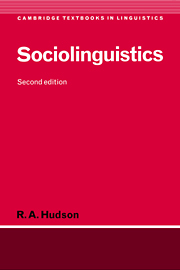5 - The quantitative study of speech
Published online by Cambridge University Press: 05 June 2012
Summary
Introduction
The scope of quantitative studies of speech
For some sociolinguists the work we shall be describing in this chapter is sociolinguistics (see, for example, Trudgill 1978: 11), though the value of the work covered in the preceding chapters is generally acknowledged. The development of quantitative studies of speech has coincided with that of sociolingustics and, for many linguists whose main interest is the structure of language, this part of sociolinguistics apparently makes the most relevant contribution, providing new data which need to be reconciled with current linguistic theories.
Quantitative studies of speech seem particularly relevant to theoretical linguistics because they involve precisely those aspects of language – sounds, word-forms and constructions – which theoretical linguists consider central. In chapter 2 we discussed the notion ‘speech variety’, covering the notions ‘language’, ‘dialect’ and ‘register’, but many theoretical linguists think that these concepts are not problematic, and therefore not particularly important. In chapter 3 we explored the relations of language to culture and thought, an area that theoretical linguists have traditionally left to anthropologists and psychologists. Chapter 4 was about discourse, and showed (among other things) that speakers match their speech to fit the needs of the occasion. The aspects of speech referred to were mainly on the fringe of what many linguists would call language structure – vocatives, greetings, alternative pronoun-forms and so on, not to mention non-verbal behaviour.
- Type
- Chapter
- Information
- Sociolinguistics , pp. 144 - 202Publisher: Cambridge University PressPrint publication year: 1996

